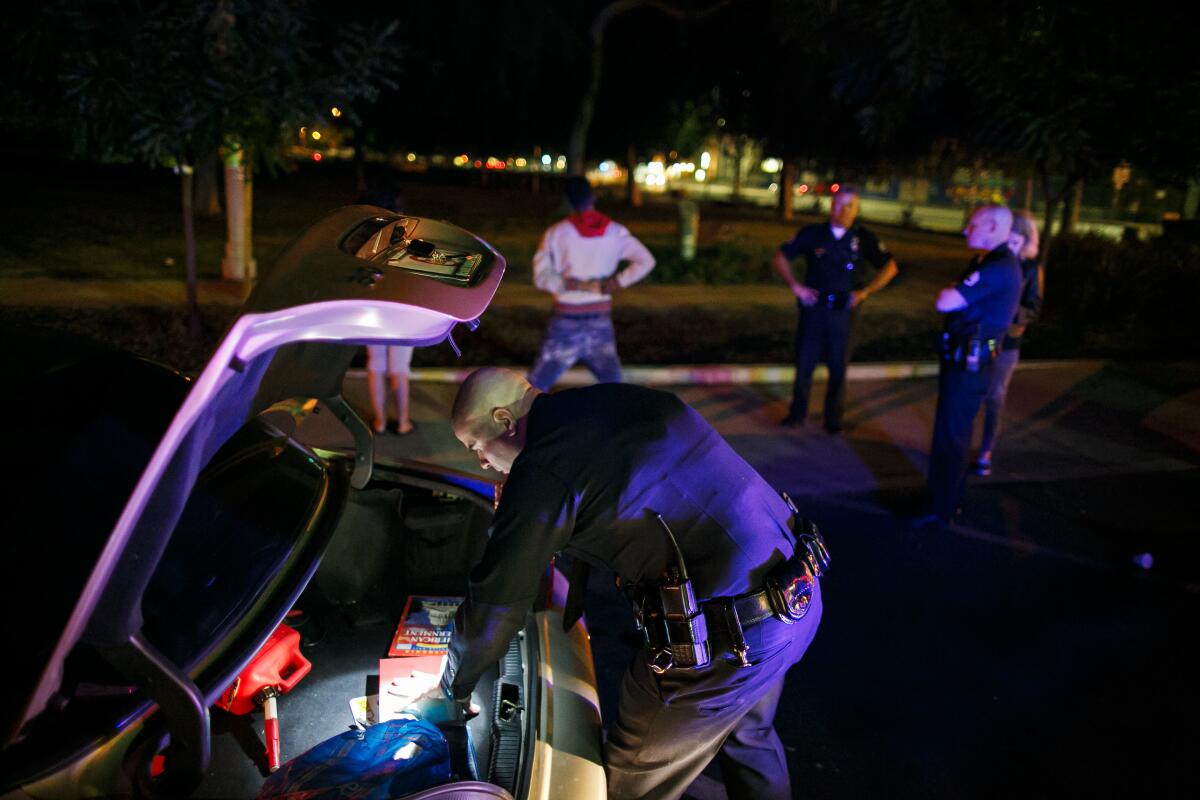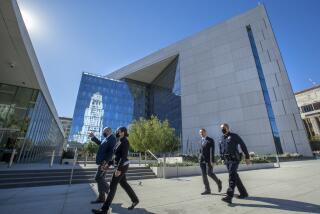Training and discipline proposed for LAPD officers in new policy on traffic stops

- Share via
Under proposed rules, Los Angeles police officers who fail to explain why they escalate mundane stops into criminal investigations will be forced to undergo training and then face increasingly severe punishments.
On Tuesday, the Los Angeles Police Commission is expected to vote on the controversial new policy that would restrict an officer’s ability to conduct pretextual stops, in which police pull over drivers or pedestrians for minor violations and then investigate them for more serious crimes.
If the proposal passes, which is expected, officers would be required to record themselves on their body-worn cameras before or during stops explaining why they suspect a person of committing a more serious crime.
The commission considered a first draft of the proposed policy earlier this month, but held off on voting to allow members of the public to weigh in and to continue discussions about the proposal with officials from the union that represents rank-and-file officers.
A new draft of the policy, which includes language on how officers who don’t adhere to the new rules will be disciplined, was released Friday as part of the Police Commission’s agenda for its meeting Tuesday.
“A failure to sufficiently articulate the information which — in addition to the traffic violation — caused the officer to make the pretext stop, shall result in progressive discipline, beginning with counseling and retraining,” according to the new language. “Discipline shall escalate with successive violations of this mandate.”
The policy does not outline any specific punishments.
The discipline proposal further rankled leaders of the Los Angeles Police Protective League, the union that represents officers. The union had opposed the earlier version of the policy, saying that it would hamstring officers from conducting routine, legal stops that are a main tool to fighting crime.
On Friday, the union’s board of directors called the Police Commission “tone-deaf” for ordering the policy changes.
“Ordering police officers to not enforce the law will further embolden criminals and keep more guns on our street,” the union leaders said. “This is a reckless policy that begs the question: what’s next? Stop enforcing the law on misdemeanor crimes, some felonies?”
The union leaders said the new discipline language “will have a negative impact on community policing” if officers are “told they can get in trouble for making a lawful car stop.”
Reform advocates also have denounced the new policy, though for different reasons: They argue that pretextual stops disproportionately affect people of color and should be banned outright. In a letter sent by dozens of critics to the commission, they called the proposed policy a “sham” reform that would simply give police officers added cover to continue harassing people of color.
“While claiming to restrict or limit these stops, the policy in fact spells out how officers can continue the same abusive behavior under a new guise,” they wrote.
Reform advocates also took issue with the new discipline language, calling it toothless.
Leslie Johnson, vice president of organizational development at Community Coalition, said Friday that many community organizations opposed the policy because it doesn’t end pretextual stops and “dismissed the lived realities of Black and brown people.”
The proposed plan to train and punish officers doesn’t change their position, she said, because it lacks “mechanisms for enforcement” outside of the LAPD’s internal discipline processes, and communities “can’t trust that this department will hold itself accountable.”
Reform advocates have criticized previous attempts at so-called progressive discipline in the LAPD as ineffective and overly lenient. Most recently, officers violating the department’s COVID-19 mask mandate often escaped punishment entirely, critics said.
Pretextual stops have come under increasing scrutiny in Los Angeles in recent years.
In a 2019 analysis, The Times found that Black and Latino drivers were stopped more often than white drivers despite being less likely to have contraband on them, and that Black drivers were stopped at a rate more than five times their share of L.A.’s population.
A subsequent study by the LAPD’s inspector general also found in 2020 that Black and Latino drivers were stopped far more than white drivers despite being less likely to have contraband, and that the stops were “of limited effectiveness in identifying evidence of illegal firearms or other serious crimes” — with just 2% of traffic stops resulting in an arrest.
In response to those findings, the Police Commission directed the LAPD to revise its policy on pretextual stops.
If adopted, the new policy requires that such stops “should not be based on a mere hunch or on generalized characteristics such as a person’s race, gender, age, homeless circumstance, or presence in a high-crime location.”
And unless the officer can clearly state why he or she suspects a more serious crime has been committed, the length of time someone is detained must not go beyond what is necessary to address the minor violation that was the reason for the stop.
Lizabeth Rhodes, the LAPD’s director of constitutional policing and policy, said this month that the new policy balances public safety needs with the department’s need for community collaboration and trust, restricting such stops without banning them completely.
More to Read
Sign up for Essential California
The most important California stories and recommendations in your inbox every morning.
You may occasionally receive promotional content from the Los Angeles Times.











